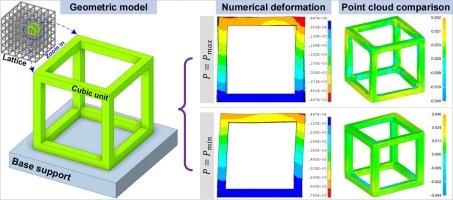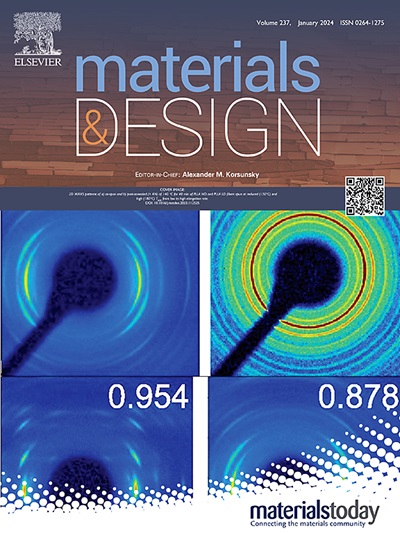研究印刷转角对选择性激光熔化中结构变形和应力的影响
IF 7.6
2区 材料科学
Q1 MATERIALS SCIENCE, MULTIDISCIPLINARY
引用次数: 0
摘要
增材制造(AM)技术有助于制造复杂的结构,而打印路径会对热分布产生重大影响,进而影响应力分布和结构变形。路径规划的主要挑战是确定一个打印转角,以确保均匀的热分布,从而在保持打印效率的同时最大限度地减少结构变形。为解决这一问题,我们提出了一种综合函数,它能全面描述印刷转角和印刷路径长度对印刷结果的影响。结合特定的立方多孔结构,我们计算了复合函数 P 的最大值(Pmax)和最小值(Pmin),并将 Pmax 和 Pmin 路径的结构变形和应力与典型的 Pzigzag 路径的结构变形和应力进行了比较。有限元法(FEM)模拟和实验验证表明,与 Pzigzag 路径和 Pmin 路径相比,Pmax 路径的结构变形和残余应力明显更小。本文章由计算机程序翻译,如有差异,请以英文原文为准。

Investigation of printing turn angle effects on structural deformation and stress in selective laser melting
Additive manufacturing (AM) technology facilitates the creation of complex structures, where the printing path significantly impacts thermal distribution, subsequently influencing stress distribution and structural deformation. The primary challenge in path planning is to determine a printing turn angle that ensures uniform thermal distribution, thereby minimizing structural deformation while maintaining printing efficiency. To address this issue, we propose a composite function, which comprehensively characterizes the effects of the printing turn angle and the length of the printing path on the printing results. Combining a specific cubic porous structure, we calculate the maximum (Pmax) and minimum (Pmin) values of the composite function P, and compare the structural deformation and stress of the Pmax and Pmin paths with those of the typical Pzigzag path. Finite element method (FEM) simulation and experimental validation show that the Pmax path achieves significantly lower structural deformation and residual stress compared to the Pzigzag path and Pmin path.
求助全文
通过发布文献求助,成功后即可免费获取论文全文。
去求助
来源期刊

Materials & Design
Engineering-Mechanical Engineering
CiteScore
14.30
自引率
7.10%
发文量
1028
审稿时长
85 days
期刊介绍:
Materials and Design is a multi-disciplinary journal that publishes original research reports, review articles, and express communications. The journal focuses on studying the structure and properties of inorganic and organic materials, advancements in synthesis, processing, characterization, and testing, the design of materials and engineering systems, and their applications in technology. It aims to bring together various aspects of materials science, engineering, physics, and chemistry.
The journal explores themes ranging from materials to design and aims to reveal the connections between natural and artificial materials, as well as experiment and modeling. Manuscripts submitted to Materials and Design should contain elements of discovery and surprise, as they often contribute new insights into the architecture and function of matter.
 求助内容:
求助内容: 应助结果提醒方式:
应助结果提醒方式:


